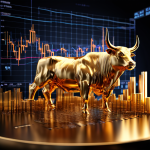Monkey Investing: Why Chaos Outperforms Genius More Often Than Anyone Admits
Nov 17, 2025
How Randomness, Psychology, and Human Blind Spots Keep Beating Wall Street
In the polite theatre of Wall Street, where confidence substitutes for competence and jargon works as camouflage, the most uncomfortable truth is also the simplest: randomness routinely humiliates expertise. No institution likes admitting it. No analyst wants the comparison. Yet decade after decade, data keeps resurfacing, cutting through the ritual of forecasts and models.
A monkey with a dartboard has embarrassed the most decorated professionals. Literally.
This is not satire. It is a diagnostic report on human behavior, revealed through markets that punish ego and reward those who stop pretending they can see the future with perfect clarity. When randomness beats certification, it is not randomness that is extraordinary. It is we who are predictable.
When the Monkey Wins: The Data Wall Street Hopes You Forget
Raven the Dart-Thrower and the Portfolio That Outran Six Thousand Professionals
In the Wall Street Journal’s famous experiment, a monkey named Raven was given $1,000 and a list of 133 internet stocks. She threw darts. Her portfolio outperformed over 6,000 professionally managed funds.
She did not analyse GDP.
She did not track liquidity cycles.
She did not sit through risk committee meetings.
She threw darts.
And she won.
This was not an isolated embarrassment. The University of Chicago repeated the idea at scale. Over thirty years, randomly selected portfolios outperformed the S&P 500 by an average of 1.7 per cent annually. Cambridge researchers asked inexperienced students to choose stocks randomly. The students beat professionals who had resources, networks, models, and reputations at stake.
If these were one-off flukes, the industry could laugh them off. But they are not. They reveal something that most investors sense instinctively but rarely articulate: expertise folds under pressure because human nature does. The monkey wins not because she is insightful, but because she does not share our weaknesses.
We overthink.
We chase narratives.
We fall in love with forecasts.
We crumble under noise.
Raven does not.
Mass Psychology: The Invisible Giant That Makes Experts Stumble
The Market Never Has a Logic Problem. It Has a Human Problem.
Herd behaviour does not begin with crowds. It starts with individuals who refuse to admit they are part of a crowd.
H. L. Mencken once joked that no one goes broke underestimating public intelligence. Markets prove him right every decade. Expertise collapses when emotion overwhelms discipline. Analysts cling to consensus because standing alone is psychologically violent. Professionals become followers because institutions punish deviation more than they punish poor results.
The monkey does not face career risk.
The monkey does not follow the herd.
The monkey does not fear embarrassment.
The monkey picks.
The Fugger banking dynasty understood this centuries before behavioural finance existed. They built wealth by tracking what people desired, feared, and envied. Not models. Not projections. Human nature.
The Medici family mastered another layer: information as leverage. They shaped narratives long before the printing press democratized panic. They understood that markets are mental arenas before they become economic ones.
Crowds move in emotional waves. Financial systems amplify those waves. Most investors drown in them.
Unless they step aside from human impulses and think like the monkey who has nothing to prove and no ego to protect.
Technical Analysis: Order Inside Chaos
Patterns, Pressure Points, and Why Structure Beats Forecasting
Technical analysis is not mystical geometry. It is a visual map of mass psychology. Price patterns are records of tension, panic, greed, hesitation, capitulation, and relief. They are not future predictions. They are present truths.
When a breakout fails, you are witnessing doubt.
When volume explodes, you are watching conviction.
When RSI diverges, you are observing exhaustion.
When consolidation tightens, you are seeing pressure build.
Professionals often misread these because they try to explain patterns through narratives. Raven does not. She does not burden herself with the story. She accepts the structure.
That clarity is elegant.
But clarity is available to humans, too, if they stop worshipping predictions and start respecting pressure dynamics. Technical analysis gives you the rhythm of the crowd without the noise of its opinions.
This is why masters of TA often outperform fundamental purists. Fundamentals tell you what the asset is. Psychology tells you where the asset is going.
Contrarian Thinking: The Counterpunch That Turns Chaos Into Advantage
When the Crowd Is Loudest, the Return Potential Is Highest
Mark Twain once advised that whenever you find yourself on the side of the majority, pause and reflect. In markets, that pause is oxygen. Most people cannot take it. They rush where others rush. They buy where others buy. They sell where others sell.
The dot-com bubble was powered by belief, not value. The housing bubble was powered by denial, not data. In both cases, experts had access to information that should have given them an edge. Yet they drowned with everyone else. Not because they lacked intelligence, but because they lacked independence.
A University of Maryland study revealed something almost tragic: professional fund managers herd more aggressively than retail traders. Their careers depend on fitting in. Their risk is social, not financial.
The contrarian sees this and walks in the other direction. Not recklessly. Not rebelliously. Rationally.
Contrarian does not mean “opposite.”
Contrarian means “outside the panic.”
When the majority is euphoric, the contrarian whispers caution.
When the majority is terrified, the contrarian whispers opportunity.
And the monkey, unintentionally, behaves in a contrarian way simply because she does not know the script.
Breaking Free: How Normal Investors Escape the Psychological Web
Stop Thinking Like the Crowd. Stop Thinking Like Experts. Think Like a Builder.
To outperform, you do not need more information. You need fewer emotional distortions. The step-by-step path:
1. Focus on Value, Not Buzz
Value investing is not glamorous. It requires patience and analysis. You look for companies whose fundamentals outshine their price. You ignore hype. You study revenue durability, debt load, competitive moat, insider buying, and cash flow resilience. Buffett built an empire by doing precisely this, long before CNBC turned markets into entertainment.
2. Use Technical Markers as Reality Checks
Value without structure is blind. TA without fundamentals is reckless. Combine the two. When a value stock forms a base, holds support, or breaks out with substantial volume, the psychological alignment creates a high-probability window. These windows only appear to those who look past emotions.
3. Cultivate Contrarian Reflexes
When everything in you screams to follow the crowd, pause. Ask: is this fear mine or inherited? Is this excitement data-driven or narrative-driven? Most people cannot answer. That is the opening.
4. Accept Discomfort as Part of the Process
Market success does not feel good at first. It feels lonely. It feels strange. Contrarian entries always feel wrong. That wrongness is the signal.
5. Build a System, Not a Fantasy
The monkey wins because she has no expectations. Humans lose because they want control. Build rules so you do not have to negotiate with yourself under pressure.
Rationality is a habit. Not a talent.
The Real Lesson: The Market Is a Mirror, Not a Puzzle
The Monkey Is Not the Hero. The Monkey Is the Contrast.
The power of the monkey narrative is not that the monkey is brilliant. It is that humans repeatedly demonstrate how predictable and self-defeating their behaviour becomes when money enters the equation.
We chase familiar illusions:
Fear of missing out.
Fear of loss.
Fear of being wrong.
Fear of criticism.
Fear of isolation.
These fears shape trades more than data ever will.
Behavioural finance pioneers like Daniel Kahneman and Amos Tversky mapped these distortions with clinical precision. Gustave Le Bon and early crowd theorists described how individuals lose autonomy in collective movements. Freud wrote about the unconscious impulses that steer decision-making far more than logic does.
Markets did not invent these weaknesses. Markets expose them.
Conclusion: Why Monkey Investing Keeps Winning
You Do Not Need Genius. You Need Discipline, Independence, and a Little Cynicism.
A final set of numbers anchors the point:
- Dart-driven portfolios beat the S&P 500 by 1.7 per cent annually over thirty years.
- Cambridge students with no experience beat seasoned fund managers.
- Forty to sixty percent of active managers underperform benchmarks every single year.
- Ninety per cent underperform for over fifteen years.
These are not anomalies. They are patterns.
And they point to a conclusion sharper than most investors want to face.
Markets do not reward brilliance.
They reward clarity.
They reward detachment.
They reward the ability to think clearly in environments designed to muddy thought.
Monkey investing is not a strategy. It is a mirror held up to a world where ego outmuscles discipline and where complexity is mistaken for intelligence.
To beat the market, you do not need a dartboard.
You need:
A rational framework.
A psychological edge.
A refusal to think like the herd.
The courage to hold steady when noise rises.
The humility to respect randomness without surrendering agency.
Success belongs to those who understand human nature, not those who try to overpower it.
In the final analysis, the monkey wins not because she is superior.
She wins because she is free—free from bias, free from panic, free from narrative addiction, free from ego, free from the seduction of certainty.
If investors learned to strip away their distortions even halfway as effectively, the monkey would retire.
But she has not retired yet.
And that tells you everything about the real battlefield.













